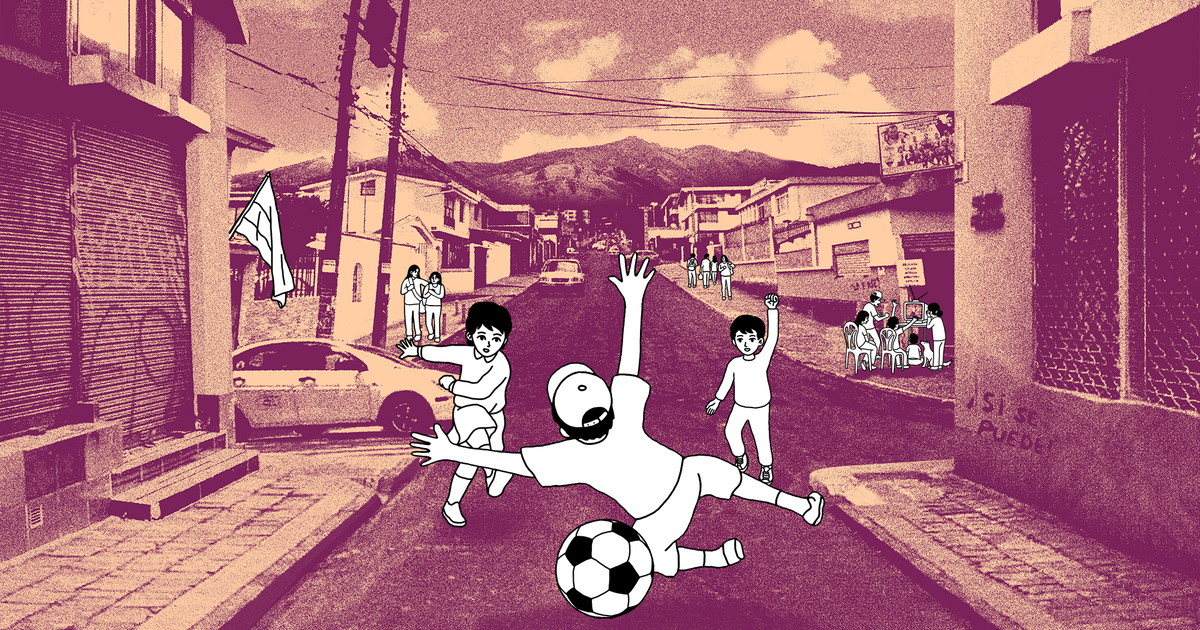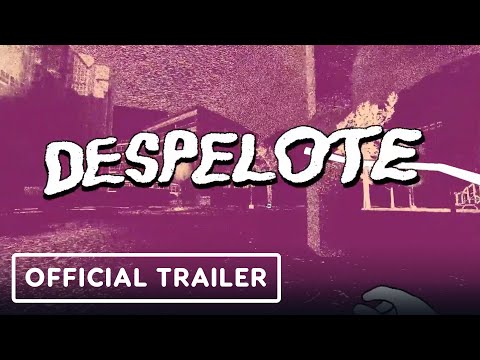For such an ostensibly small game, there’s such bigness to Despelote. On the surface this is a game about football, its humble joys and seemingly unstoppable knack for rendering whole nations enraptured. Beneath that surface however is something more inward facing, a reflective game about its creators, and the act of creating – about the act of remembering, too, this game being one about their own, half-imagined memories. The result is special, something personal and universal all at once.
Explaining too much of Despelote, a game that spans barely two hours, risks blunting the impact of its sharpest moments, but the premise is simple enough. You play as a young Julián, a half-fictionalised version of one of Despelote’s handful of creators, Julián Cordero, kicking a ball around the streets of Ecuador’s capital, Quito, during the late summer haze of 2001.
The backdrop, as Despelote sells it, is a country suddenly captivated by football: Ecuador may be about to qualify for the World Cup for the first time in its history. The world, as it is to young Julián, comes to a standstill, often literally, as neighbours and family members stop and stare at TVs in shop windows, or on bar countertops, or at very unfortunately timed wedding receptions. Football, suddenly, is life, and for Julián it’s all-consuming. You’ll stare out of classroom windows watching bigger kids play in the park, trade confiscated balls for empty bottles, or whatever else might be the nearest faintly kickable object, or crane your neck to play football video games – Tino Tini’s Soccer 99! – over the head of your mother, father, and little sister in turn.
Much of this plays out with the kind of wistful directionlessness of childhood. One of the several things Despelote makes for such a wonderful ode to is simply the nature of being a kid, in its sporadic bursts of radical freedom – to roam a vast park, say, and hop feverishly between conversational non sequiturs with friends – dotted with those moments of sudden regimentation we all remember. Wear this, wait here, be back by exactly this time, take this test. Don’t expect much in the way of direction between those moments – instead do as a kid does. Punt a ball around. See what people do with it. Follow your feet.
Quickly, though, these warmly poignant memories will give way, Despelote’s pontillist, sepia world fading into a kind of TV static fuzz as you reach the edges of Julián’s recollection. Between memories come dreamy sequences, as you hoof ball after ball around a vast open space, Quitoan tower blocks sprouting around you at each turn, world turning from that nostalgic peach and purple to a slightly offputting green and yellow, and more beyond. More of these follow, too, as Despelote repeatedly pulls one of my favourite video game tricks: toying with the form itself, beginning with its glorious intro sequence – one of the great slow pans of any medium, not just games – and only blossoming from there.
This is where Despelote’s second layer comes in, as Cordero effectively turns the lens on himself and the rest of the game’s very small development team – Sebastián Valbuena as co-creator, plus producer Gabe Cuzzillo, sound designer Ian Berman, and Programmer Niall Tessier-Lavigne. Memories cross-contaminate from childhood into teenage years. There are passing mentions of injuries and returning pain – a dodgy knee, a short stint for a local team – and equally painful social interactions, missing party invites, absent friends. Quinto’s utopian park, where your mother was always so keen for you to play, takes on a less welcoming form, and your mother a more worried tone. And all that background, captured visually with such an extraordinarily evocative style – behind the fuzz of Despelote’s Quito is a series of real photographs, scanned in to form the game’s environment – is as much an emphasis of Ecuador’s continued economic turmoil, the nascent worries of its citizens, as it is a tale of captivation, celebration and joy.
Despelote then becomes a game of community and culture, rendered with a kind of paradoxical mix of hazy impressionism and brutal realism at once. It features some of the best sound work in recent memory, in the way its real sounds, wavelike, and recorded directly from that central park in Ecuador in the modern day, occasionally wash in and out of your periphery. And a deft approach to the way memories have such an odd mix of specificity and imprecision – Julián remembers specific childhood toys perfectly, for instance, while entire rooms might be more of a blur.
What Despelote’s developers have to say about their memories specifically – and the creative sacrifices they might have made, and the new frontiers that took them to – is worth waiting to discover yourself, but the end result is utterly unique. A kind of hybrid crossing of autobiographical documentary with fantasy retelling. A world where Cordero’s ideal childhood – and ideal family, neighbourhood, and nation – are layered over the real ones (even down to the telling omniscience of its characters; how do these people know Ecuador is on the edge of a shock World Cup qualification, after all, when it still has five points left to win from matches against the likes of Argentina and Columbia?).
And, yes, also a world where football is indeed a community’s lifeblood. Against all its vivid colour, the meaningful people and objects of Despelote’s Ecuador are all drawn in simple, black and white lines, as though they themselves have all sprouted from the black and white hexagons of the classic football you hoof around the park. The thing where Julián’s world begins and ends.
A copy of Despelote was provided for review by Panic.

